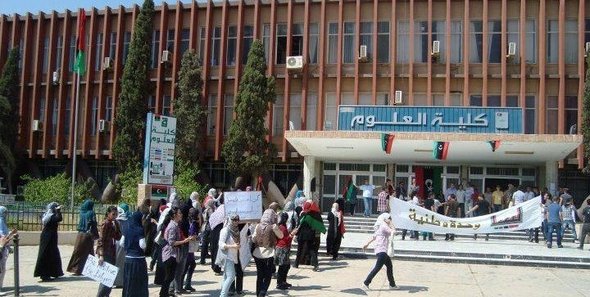By Mohamed Eljarh.

London, 30 November:
Scientific research is one of the key driving factors for a diversified, strong economy . . .[restrict]in any country. Under the former regime, scientific research and higher education suffered from negligence, corruption and lack of political commitment and reform.
Higher education in Libya faces some major challenges. These include increasing demands for improvements, raising the quality of graduates and their career prospects. There are also problems about accreditation and the quality of educational institutions and programmes, not to mention the financing and governance of the institutions. Another major challenge to Libya’s education sector is the lack of any real and effective IT infrastructure, and the lack of scholarly activities and scientific research throughout the sector.
Libya’s ability to build a strong and diversified economy will depend on its commitment to innovation, creativity and commercialisation within the higher education and scientific research sector.
The status of this sector in Libya could be characterised as follows:
First, scientific research and development funding is very scarce standing at less than 0.05% of GDP or $120 million — just $20 spent on scientific research and development per person in Libya according to governmental data.
Furthermore, there is no real commitment to scientific research in Libyan universities and the country does not benefit from generous international grants in the fields of scientific and social research because of the absence of any cohesive vision for the sector.
Elsewhere, the private sector usually plays an integral role in the higher education and scientific research sector through partnerships, funding and collaborative projects. However, Libya has no effective, responsible private sector, able and willing to do this.
Second, human resources in the field of scientific research and development are insufficient and mismanaged. In addition, the education, higher education and scientific research sectors in Libya are negative traditional learning environments where creativity and innovation are almost non-existent among staff and students. The education sector in Libya lost its purpose when the focus on the end-product of the educational process was lost. That led to lack of fully qualified and skilfully equipped university graduate population.
Students were never the focus of the learning process; they have become an increasingly passive element. As a consequence, there is a lack of skilled graduates who possess the knowledge and skills required by the labour market, and this had impacted negatively both on Libya’s scientific research base and its industrial competitiveness.
Another negative factor is the lack of commitment to scientific research by qualified researchers despite studying at universities abroad. For example, the research output within the School of Medicine at Tripoli University is 1.4 papers per 100 academic staff according to a study conducted by Benghazi University and Manchester Metropolitan University.
Academic staff at Libyan universities should be offered incentives and have recognition for their research. Also, the teaching load for academics needs to be dramatically reduced. Furthermore, the contractual duties of academics at Libyan universities should emphasis on research and scholarly activities as part of their job description. According to government data, research and other scholarly activities account for less than five percent of academics’ duties at Libyan universities. In developed economies they account for at least 33 percent.
Third, like most sectors Libya’s higher education and scientific research sector suffers from organisational problems. The sector lacks co-operation and communication between its various institutions. In addition, there is a lack of networking mechanisms such as forums and conferences which could link the community.
Moreover, bureaucratic procedures hinder the enthusiasm of researchers in the sector, as does the lack of incentives for individuals who show initiative.
Fourth, the sector lacks the necessary IT infrastructure and resources to produce substantial output. There are no marketing and scientific publication strategies for sharing findings and good practices with the rest of the research community, either regionally or internationally.
Primary and secondary education is compulsory in Libya, which has led to increased interest in attending universities and higher education institutes. According to government data, the number of Libyans attending university went from 33 students in 1956 to 279,150 students in 2008. The number is expected to exceed the half-million-mark by the year 2025.
This rise in demand for university places needs to be met with well-planned strategies for public and private investments in the sector.
The sector requires innovative mechanisms to encourage entrepreneurism to enable graduates and researchers to start their own businesses based on their creative ideas and research.
Libya can meet the challenges in the higher education and scientific research sector. To do so, a well-planned medium to long-term strategy is required. Developments need to include facilities development in parallel with human resource development. The infrastructure for E-learning and ICT education will require significant investments in order to develop and help enhance the performance of the sector.
In addition, the sector will require closer collaboration with institutions in other countries to achieve excellent Quality Assurance Systems and accreditation of educational programmes.
Most importantly, there is an urgent need for a commitment by Libya’s new leaders towards the sector. Funding needs to increase dramatically. There is also an urgent need for robust measures to tackle corruption and financial waste in the sector.
Academic freedom was non-existent in Libya for decades. Censorship had a disastrous impact on the country’s higher education and scientific research sector. Academic freedom for staff and students within the sector should be encouraged and protected, along with the sharing of good practices.
Finally, with students’ increased awareness and their aspirations for better opportunities, the educational sector in Libya is set to be more student-focussed so it can meet the market demand for skilled graduates.
Libya’s higher education and scientific research sector needs to be one of creativity and innovation, where students and staff are encouraged to develop in new directions not previously encouraged.
Mohamed Eljarh is a UK based Libyan academic researcher and political, social development activist. He is from Tobruk in Eastern Libya. [Email: [email protected]]. Follow him on Twitter: @Eljarh [/restrict]







